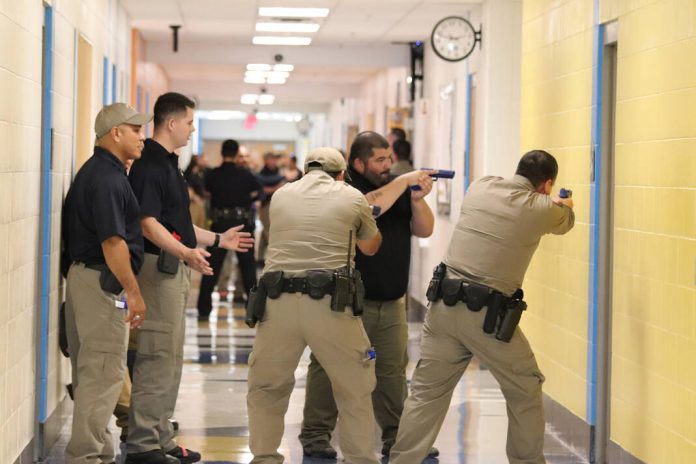RAYMONDVILLE — As the nation’s law enforcement agencies study footage of police reaction in the Uvalde massacre, Willacy County officials are training their officers to respond to active shooter cases in area schools.
This week, the Texas Department of Public Safety trained 50 officers with the Raymondville school district, the city’s police force and sheriff’s deputies in instruction in the nation’s top training program developed to respond to active shooter incidents.
At Raymondville’s Myra Green Middle School campus, instructors conducted Advanced Law Enforcement Rapid Response Training, the program developed at Texas State University which the FBI defines as setting the “national standard.”
Now, Sheriff Joe Salazar is planning to take his deputies on “walk-throughs” of the area’s schools to familiarize them with the campuses.
Hitting home
“I recognize there’s more violence and more threats and we certainly have to prepare, being observant,” Raymondville school district Police Chief Oscar Gutierrez said.
This year, authorities have arrested students in two communities in this farming county.
In February, deputies arrested a 19-year-old Lasara student caught with a loaded pistol in school, authorities said.
Then in May, police arrested an eighth-grader for making terroristic threats at Myra Green Middle School, authorities said.
“I’ve seen a rise in the behavior,” Gutierrez said. “It’s more violent.”
Like Gutierrez and lawmen across the country, Salazar struggles with the nation’s growing violence spawning younger killers and more mass shootings.
“It’s a very tragic thing, these mass shootings,” he said. “We pray it doesn’t happen. But the reality is, it’s not a question of ‘if’ — it will happen. We have to stay vigilant — we have to prepare in the event we have to react.”
Small-town America
Since the Uvalde massacre, small towns across the country are ramping up police training.
“You never expect it to happen in your community,” Raymondville Police Chief Uvaldo Zamora, who trained 15 members of his department, said. “We need to be prepared. In a small community, we get complacent. Look at Uvalde — they’re the same size we are. We don’t want to be caught off guard. Every agency should make this training a priority for their officers so when they have to deal with a violent situation or during any active shooter response, we can protect lives and be able to serve our communities better.”
‘More intense’ training
In the wake of the Uvalde shootings, this year’s training was “more intense,” Gutierrez, who trained six of his officers, said.
“It’s very specific,” he said. “It’s designed for the active shooter or the barricaded subject and how to neutralize the activity. It’s a matter of engaging the threat — how to approach the activity. The training is critical. It’s training you’re going to reflect on. It goes to the part of the brain that tells you to respond. It’s technique. You’ve got to practice — you’ve got to keep yourself keen to respond.”
This year, 10 DPS instructors taught the program through four days.
“This one is more intense,” Gutierrez said. “We have had more scenarios this year than before — how to evaluate and how to neutralize the shooter, how to do room-entry techniques.”
Planning school ‘walk-throughs’
Next week, Salazar plans to take his deputies to the area’s schools to conduct “walk-throughs” to familiarize them with the campuses to better deal with active shooter incidents.
“I believe it’s imperative to get that familiarization,” he said. “It’s basic familiarization with buildings, school campuses. That way, first responders know in advance where they’re going. Heaven forbid something like this happening here, but our deputies on patrol would get to the problem quicker.”
Then he added, “It’s important we continue to show a solid presence in the campuses.”
Uvalde at the ‘forefront’
The Uvalde massacre was at the “forefront” of his deputies’ minds as they trained to deal with an active shooter, Salazar said.
“As things like this happen, it’s in the forefront of your mind and it tends to light a fire — ‘this needs to be done,’” he said, referring to the training sessions. “I pretty much got all my deputies trained up in all the latest tactics —
regular tactics utilized, body armour that comes into play. They run scenarios and those getting trained get in the mindset of this. If you’re not training, you lose the knowledge — that edge. That’s very beneficial, especially for agencies that don’t have a lot of money to cover training.”




